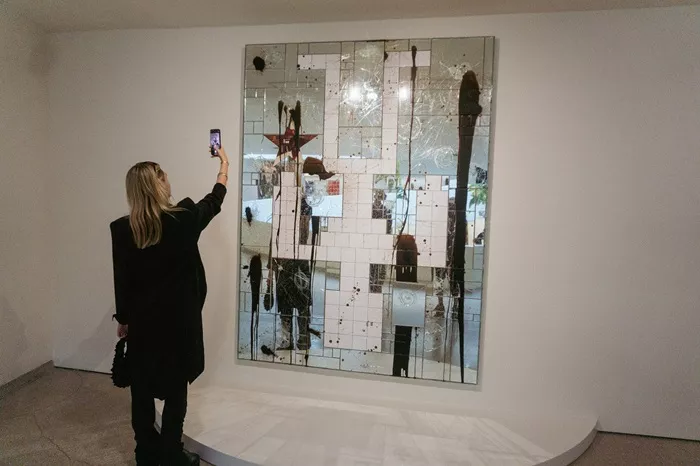<p class=”” data-start=”180″ data-end=”687″>The Guggenheim Museum’s latest exhibition, Rashid Johnson: A Poem for Deep Thinkers, offers an intimate and comprehensive look at the acclaimed artist’s three-decade-long career. Curated by Naomi Beckwith and Andrea Karnes, the exhibit spans over 90 works, drawing upon themes of race, identity, mental health, and collective cultural expression. This is Johnson’s most extensive solo exhibition to date, and it transforms the museum’s iconic rotunda into an immersive exploration of his artistic journey.
The exhibition is anchored by a powerful new installation, “Sanguine,” which occupies the central space of the Guggenheim’s spiraling ramp. This site-specific installation is a living, breathing archive of Black history, featuring steel structures that hold live plants, books by notable Black writers, and an upright piano that invites public interaction and performance. Designed to engage both the space and its visitors, “Sanguine” aligns with Frank Lloyd Wright’s original vision of the Guggenheim as a dynamic, living structure. The installation serves as a contemplative space, inviting visitors to reflect on the ongoing conversation around cultural inheritance and mental health.
Throughout the exhibition, Johnson uses a variety of materials—such as black soap, shea butter, ceramic, and wax—to explore themes of Black identity and the emotional weight of personal experience. His series Anxious Men and Broken Men stands out in this exhibition. Featuring faces scratched into tiled surfaces, these works evoke a sense of memory and trauma, with marks that seem to persist like unspoken burdens. These poignant images speak to the visible and invisible stresses that shape Black lives, underscoring the emotional complexity of personal and collective history.
Rashid Johnson: A Poem for Deep Thinkers is a powerful testament to the artist’s vulnerability and vision. It offers a space for reflection on the complexities of race, identity, and mental health in contemporary society. The exhibition is on view at the Guggenheim Museum in New York City until January 18, 2026.

